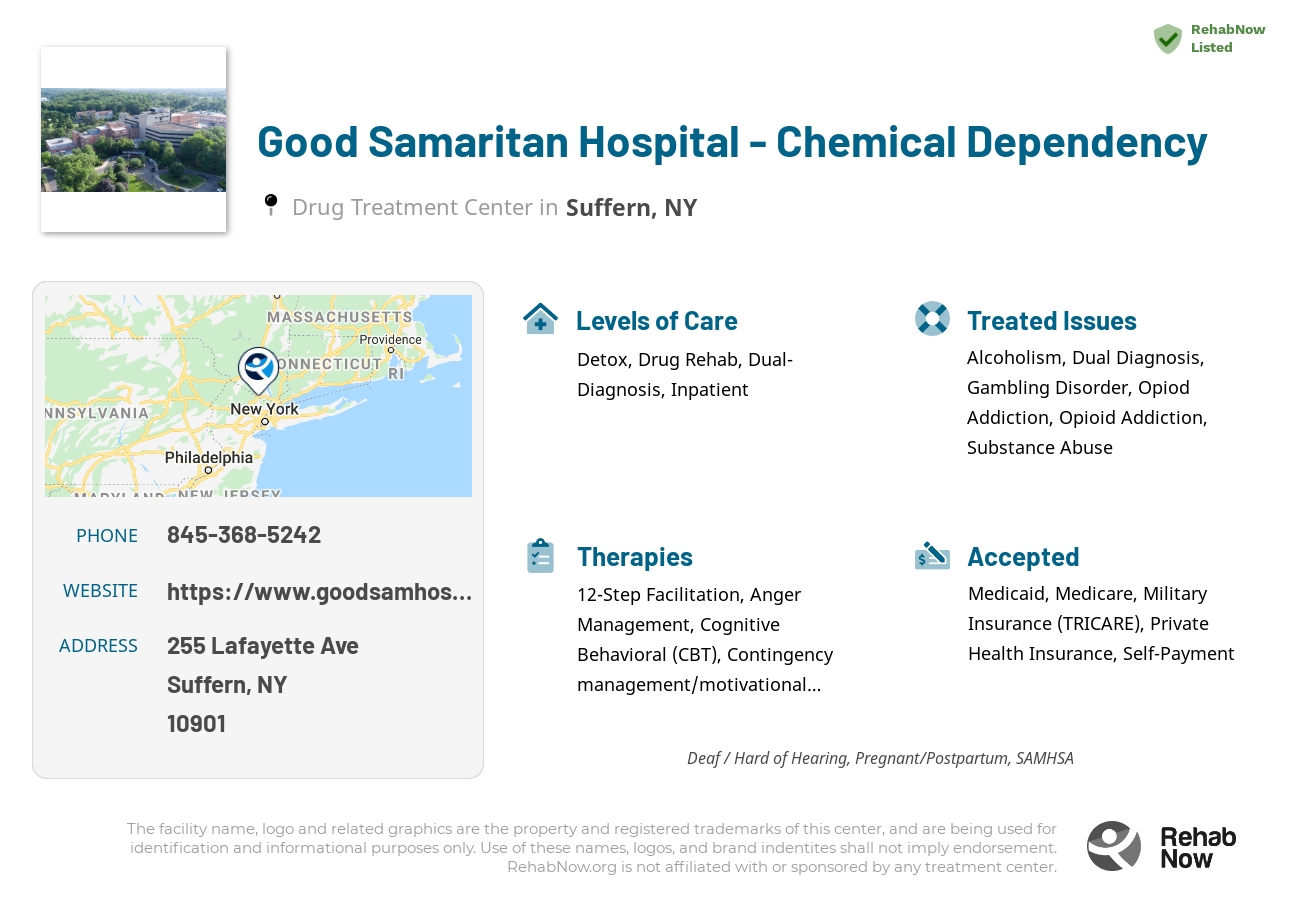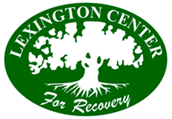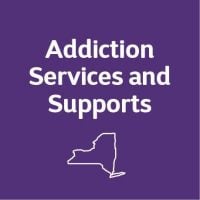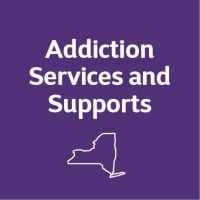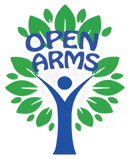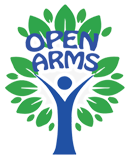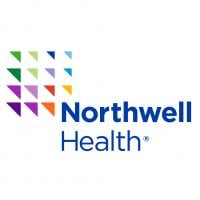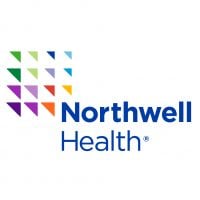Good Samaritan Hospital - Chemical Dependency
Drug Rehab Center in Suffern, New York
Good Samaritan Hospital - Chemical Dependency offers quality care, detoxification and inpatient services, given by experienced and compassionate staff, to help New Yorkers with addiction achieve and maintain sobriety.
About This Suffern, NY Facility
Good Samaritan Hospital - Chemical Dependency, located in Suffern, NY, specializes in treating alcoholism, drug addiction, and substance abuse within a comprehensive hospital setting. Offering a range of evidence-based therapies, this facility aims to help individuals regain control over their lives.
Accredited by CARF, SAMHSA, and holding a state license, Good Samaritan Hospital - Chemical Dependency meets the highest standards of care. Their dedicated team utilizes counseling, medication-assisted treatment, and holistic approaches to create personalized treatment plans for each individual.
• Inpatient drug rehab programs
• Dual-diagnosis treatment for co-occurring disorders
• Detoxification services
• Comprehensive aftercare planning
Good Samaritan Hospital - Chemical Dependency focuses on treating addictions to alcohol, opioids, and various substances. Their specialized programs address the unique challenges faced by those struggling with alcoholism, opioid dependence, and polysubstance abuse.
For individuals battling an opioid addiction, Good Samaritan Hospital - Chemical Dependency offers a structured inpatient program. Through a combination of medication-assisted treatment, counseling, and behavioral therapies, they help patients safely detox and develop coping strategies for long-term recovery.
Genders
Ages
Modality
Additional
Accreditations
SAMHSA
Conditions and Issues Treated
Rehab centers exist in Suffern, NY to help individuals bounce back from substance abuse, which is an umbrella term for drug and alcohol addiction. Drug addiction refers to the use of illegal drugs and improper use of prescription drugs. Centers like Good Samaritan Hospital - Chemical Dependency provide individuals a chance to access individual and group therapy that can be monumental for recovery.
Substance abuse includes all problems that stem out from using various psychoactive substances. It is also a diagnostic term used by Diagnostic and Statistical Manual of Mental Disorders (DSM-IV) to define the mental and physical impairment or distress caused by misuse and overuse of certain substances in a period of 12 months.
Opioid addiction involves addiction to legal or illegal opioids. It may happen very quickly with any opioid use. Sometimes within a matter of days. Opioid addiction is a known as a high-risk factor for future heroin addiction.
Opioid withdrawal can be extremely uncomfortable and lead the user to continue to use even if they want to quit. Stopping using an opioid requires careful medical observation. Sometimes the withdrawal can persist for many weeks, which can put the user at a high risk for relapse.
It is recommended to receive inpatient treatment and a medically supervised detox like those offered at Good Samaritan Hospital - Chemical Dependency in Suffern, NY, NY, to manage the withdrawal process while learning lasting tools to maintain recovery. In some circumstances medications can be used to manage opioid addiction.
Substance use disorder falls under two categories: Alcohol or Drug Abuse and Drug Dependence. An individual suffering from a substance use disorder and mental health disorders is said to have a co-occurring disorder or a dual disorder. Individuals in Suffern, NY with substance use disorders and mental health problems are said to suffer from a ‘dual diagnosis’.
The most frequently identified mental health issues found in individuals with substance use disorders include anxiety, depression, schizophrenia, and schizoaffective disorder.
Levels of Care Offered
This center offers a variety of custom treatment tailored to individual recovery. Currently available are Detox, Drug Rehab, Dual-Diagnosis, Inpatient, with additional therapies available as listed below.
Detox is the first step of rehab. It involves giving a person time to get the toxins out of their body. During detox, the patient gets ill, and they will often start using again to get rid of these unpleasant feelings. That’s why it’s important to have a medical professional at Good Samaritan Hospital - Chemical Dependency present. A medical professional will make sure patients don’t start using during detox. They will also likely provide medication to ease their symptoms and coach them through on a mental level.
Inpatient rehab programs like what’s offered at Good Samaritan Hospital - Chemical Dependency in Suffern, NY are ideal for covering all the bases that surround one’s addiction. It’s considered the most comprehensive approach to care for people afflicted with addiction. Patients live in a facility where they have access to therapy and medical care 24/7.
Good Samaritan Hospital - Chemical Dependency‘s Therapies & Programs
Couples therapy is an approach wherein the patients and their partners are engaged together as a part of the treatment process. When a person becomes a victim of substance abuse, it affects the patient and the people around him, particularly his partner. Their relationship can become strained due to lack of communication, financial issues, loss of trust, lack of intimacy, and physical abuse in more severe cases.
Couples therapy addresses these issues and tries to rebuild the trust between the partners. The partner’s involvement in the process will result in greater chances of treatment success and sustained recovery.
Family therapy is a set of therapeutic approaches that assumes that the entire family is a system. It utilizes the strengths and resources of the family to help the patient refrain from resorting to substance abuse. It helps to repair relationships and improve communication between family members.
Group therapy happens at Good Samaritan Hospital - Chemical Dependency in a controlled group environment, as opposed to a one-on-one setting. It supports Suffern, NY patients’ recovery by offering a sense of comfort and letting them know that they are not alone. Through shared conversations, patients also learn to develop faith and understanding and gain insight on their addictions.
Unresolved trauma is often a key reason why many patients resorted to substance abuse. Trauma therapy refers to treatment wherein specialist therapists help the patients to resolve the trauma that led the patients to substance abuse. The trauma could be physical abuse, sexual abuse, war, natural disasters, divorce, accident, loss of a loved one, etc. Thinking of these traumatic events causes emotional disturbances like anxiety, depression and results in addiction. If trauma is the primary cause of substance abuse, then both issues must be addressed. Otherwise, there is a risk of relapse. Trauma therapy also improves the cognitive functions and provides long term benefits.
Dialectical Behavior Therapy (DBT) is an improved version of Cognitive Behavioral Therapy (CBT). DBT is a treatment of choice for people suffering from self-harming behaviors characterized by cutting and suicidal thoughts or inclinations.
This treatment is developed to help individuals recognize their thought patterns, behaviors, and feelings. It has demonstrated its effectiveness for people that are finding it difficult to control their emotions and urges. Conditions such as obsessive-compulsive disorder and borderline personality disorder also benefit from DBT as it imparts individuals stress-management techniques and enhanced self-esteem so they can sustain their sobriety by reducing the impact of triggers and out-of-control emotions.
Cognitive behavioral therapy (CBT) is a way of addressing concerns through talking. It can be used in individual counseling sessions. Talking through issues with professionals at Good Samaritan Hospital - Chemical Dependency can identify sources of discomfort or unhealthy thoughts. It is a way of learning about yourself and your individual perceptions. CBT is a healthy way of addressing some behaviors which may be bringing unintended consequences in your life.
Rational Emotive Behavior Therapy (REBT) sees a person suffering from substance addiction to have illogical reasoning, counterproductive actions, and does not see things clearly. Due to this, REBT deals with cognition, images, and behavior extensively to rectify the client’s bad habits. REBT pushes an individual to become more reasonable and choose a life without the repercussions of addictions.
Patients at Good Samaritan Hospital - Chemical Dependency in Suffern, NY learn how to self-soothe by conducting rational self-counseling. REBT provides their patients with the skill sets necessary in handling problems all by themselves, without seeking professional help. The process calls for practice, reiteration, and bolstering the new way of thinking being introduced to the patient.
Contingency management is a way to help motivate someone to remain substance free. It is a process of rewarding positive choices and good outcomes. As humans we are wired to recreate experiences that lead to positive feelings. Through this method incentives are used for completing positive steps towards a sober life. This may be a reward for attending meetings, remaining sober or for employment goals.
Payment Options Accepted
For specific insurance or payment methods please contact us.
Is your insurance accepted?
Ask an expert, call (888) 674-0062
Good Samaritan Hospital – NY Associated Centers
Discover treatment facilities under the same provider.
- Greenwich House - Chemical Dependency in New York, NY
- Greenwich House - Methadone Maintenance Treatment Program in New York, NY
- Good Samaritan Hospital - Drug Abuse Treatment in Suffern, NY
Learn More About Good Samaritan Hospital – NY Centers
Additional Details
Specifics, location, and helpful extra information.
Suffern, New York 10901 Phone Number(845) 368-5242 Meta DetailsUpdated April 15, 2024
Staff Verified
Patient Reviews
There are no reviews yet. Be the first one to write one.
Suffern, New York Addiction Information
More than 2 million New Yorkers are currently suffering from some type of substance abuse and many of those are minors. Alcohol abuse, in particular, is prevalent among those underage. As a result of the high prices and regulation of prescription drugs, many New Yorkers turn to heroin instead. This has led to a serious heroin epidemic in the state.
The majority of people who abuse drugs in Suffern are between the ages of 18 and 25. The most commonly abused substances in Suffern, NY include alcohol, marijuana, cocaine, heroin, and prescription drugs. Marijuana made up about 25% of all drug-related arrests. Drug abuse and addiction can lead to crime, violence, and death. It is a major contributor to the spread of HIV/AIDS and other diseases.
Treatment in Nearby Cities
- Hempstead, NY (38.9 mi.)
- Ellenville, NY (44.0 mi.)
- Tarrytown, NY (14.6 mi.)
- Ballston Spa, NY (131.5 mi.)
- Yorktown Heights, NY (21.6 mi.)
Centers near Good Samaritan Hospital - Chemical Dependency
The facility name, logo and brand are the property and registered trademarks of Good Samaritan Hospital - Chemical Dependency, and are being used for identification and informational purposes only. Use of these names, logos and brands shall not imply endorsement. RehabNow.org is not affiliated with or sponsored by Good Samaritan Hospital - Chemical Dependency.



